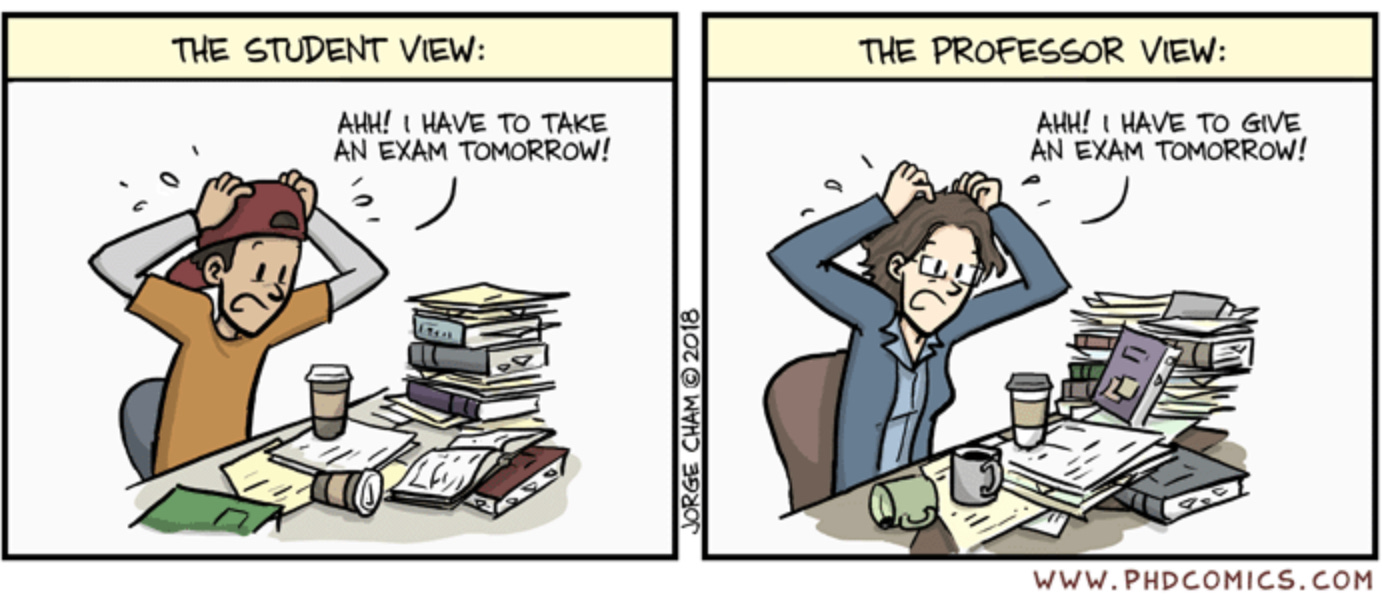Hi everyone! Hope you had a good week.
Yesterday I gave one of my final exams to a couple of my classes. As I was walking to the Education building that morning, I was thinking back to the week before — and remembering how nervous I felt as I walked my way to my ultimate final exam: comps.

As a teacher, I wish I didn’t have to give exams. They are stressful. They are often artificial measurements of knowledge. They are long to write. They are (often) painful to mark. And yet, they’re a part of the institutional system I’m in — so, I deal. And I try to coach my students to consider the exam more as an opportunity to show off their knowledge versus a ‘gotcha!’ kind of a trap.
That switch in how I position final exams comes from a shift in my teaching philosophy — more than ever, I now draw from a stance of unconditional positive regard.
I talked about this concept a bit in my comps last week, and since this newsletter is meant to be a place for more longer-form reflections, I want to muse a bit about how this mindset is starting to change not only who I am as a teacher, but also who I want to be as a person.
Unconditional positive regard was originally coined by a therapist in the 1950’s, Carl Rogers, who is behind ‘person-centered’ or ‘client-centered’ therapies. Unconditional positive regard was one of his “3 core conditions” for therapists to use to build rapport and connection with the people they are working with. Educational theorists have since used the concept as a means for teachers to better connect with their learners.
In an educational context, unconditional positive regard is a mindset that focuses on the worth, skills, and capacities of every student:
Unconditional = no conditions for acceptance, despite circumstance
Positive = what John Dewey calls “prizing” a student — showing care
Regard = individualized approach, meeting students where they are at
To have unconditional positive regard as a teacher means I try not to plaster my expectations over a student, but instead I work to accept them for who they are — not for what they can do OR by how well they do it.
This stance is NOT the same as being a patronizing pushover. If a student’s goal to get a 70% out of my course, I’m going to do my best to help them get the most out of that 70% — and I will not think any less of them for not wanting a higher mark.
Much of what guides my philosophy in the classroom is to connected to Brené Brown’s boundary-setting equation: a balance of compassion + accountability.
If I’m not careful, I tend to skew too much to the compassion side of the scale — but if you’re overly-compassionate, that can be patronizing and debilitating (not to mention emotionally exhausting). And yet if you reach too far over to the accountability side, well, then you’re just a deadline-driven asshole. As a teacher, I work to find a (tenuous) balance between the two.
That means I try not to even *think* negative thoughts about my students, because I know how much an attitude can shape actions. And most days, I get it right.
Having an unconditional positive regard mindset has also changed the way I assess students and provide them assignment feedback. Nowadays I tend to write more formative comments from a reader’s perspective versus a summative “teacher’s” voice. Instead of writing curt comments in the margin like “unclear argument” — now I’ll write “you’ve lost me as a reader in this paragraph — I don’t understand how this paragraph connects to your research question.” Or, I’ll say “it’s clear to me you don’t really want this job” vs “this resume is not targeted to the employer.”
It may not sound like that big of a shift, but responding as a reader (and as myself) has made me a happier teacher — and anecdotally, my students’ writing is so much more engaging to read. I can hear so many more of them OWNING their voices, and choosing to see their research report as an opportunity to be embraced (versus another assignment hoop to have to jump through).
Granted, I definitely still have some reports that are a drudgery to read — just as they were probably a drudgery for the student to write. But having this perspective of unconditional positive regard means that I no longer consider these kinds of reports as a judgement on the individual. Instead, I meet them where they’re at, and give them the best 65%.
Outside of class, I’m trying to have more of a unconditional positive regard mindset as well — which isn’t the easiest for me to do, because your grrrl is one judgemental individual with high expectations. Earlier this week my therapist suggested that my “zeal” for things can undermine me, in part because of how strong I can come across.
She’s right.
My therapist then challenged me: how can I better define who I am without feeling like I need to defend it?
I think having an attitude of unconditional positive regard will help.
I want to be better at accepting some people for who they are, versus being disappointed by who they are not.
And my focus should be more about making my self better, versus making others better. That’s not to say I won’t still rely on that accountability side of the relational equation, but I think there’s room for a little more compassion and space when it comes to tempering my expectations.
Things that brought me joy this week:
I played mom taxi on Thursday for Hardy’s Winter Dance, and it was so fun to watch my girl have fun with their friends. At one point as they all were getting ready, I overheard Emma say something to her friends about “my mom” — and one of her friends corrected her and said: “no, our mom.” (oh my heart)
I read a fun novel that forced me to google and learn new things: prosopagnosia (face blindness) and why it’s important to salute magpies (this article gave me newfound avian respect)
For the last class day in my public speaking course, we all played a round of PowerPoint Karaoke, and it was the best PD money I’ve ever spent. I was crying, I was laughing so hard.
I spent an exorbitant amount of money for my new hair colour(s), but it earned me the title of “the prof with the cool hair” for yesterday’s final exam proctoring
Got a care package from home! Full of Corn Pops, Xmas treats, and a surprise memory gift that brought me unexpected joy
I still have a happy “hangover” from my comps experience last week — I am so grateful to have the support and encouragement from my advisory committee, my amazing supervisor, and new group of colleagues. More than ever, I’m excited and committed to getting this degree and research done.
I’m sending out my December cards this weekend! If you want one, send me a note or leave me a comment, and you’ve got it. Anywhere in the world, because we all could use a little more light during this time of the year. <3

meme of the week:







